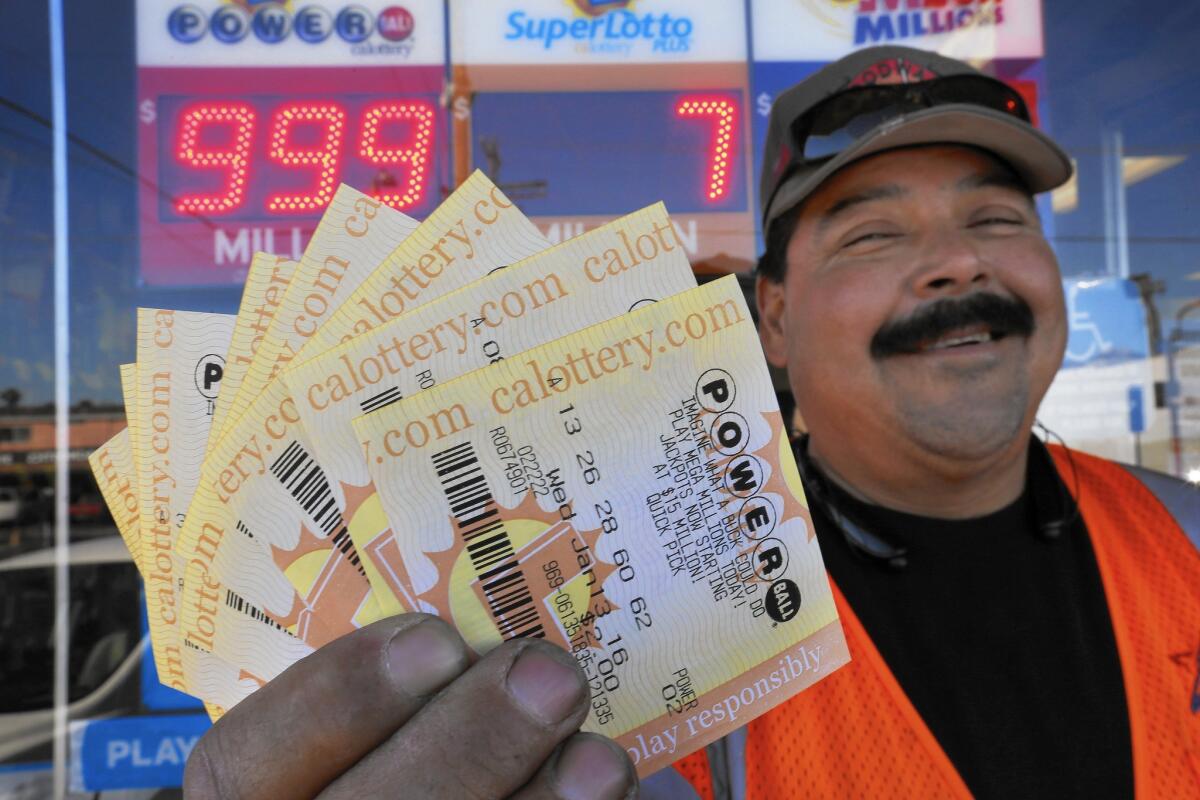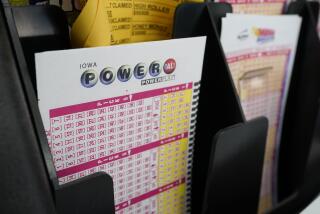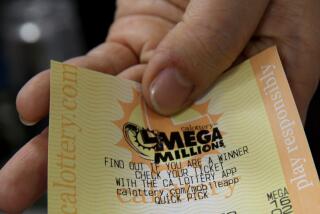Some see a dark side to Powerball frenzy — the toll on poor players

Isaiah Gonzalez has played the lottery for more than two decades. He thinks heâs won about $15 in that time.
âIf I had started putting away a dollar here and there 20 years ago, I probably would have saved up $1,500 or more,â said Gonzalez, 51.
The Long Beach resident often struggles to earn enough money painting houses to eat and pay rent. Still, the possibility of a jackpot compels him to play.
âWhat if I win?â he said. âI want the money because life is hard right now. And who wouldnât want an easier life?â
For years, the lottery has been a way for people of modest means to dream about striking it rich, no matter how low the odds. But the last few weeks have been particularly frenzied as the Powerball jackpot broke records and drawings yielded no winners.
That jackpot â now at $1.5 billion â has reignited debate about whether this is all harmless entertainment or something darker that plays on the hopes of poorer players, eroding their ability to save while offering little in return.
âTheyâre playing this to try and get back to some status ⌠and see this as their best chance of doing so,â Cornell University economist David Just said. But the chances of coming out a big winner are âastronomically low.â
The odds of winning the Powerball jackpot are about 1 in 292 million.
Lottery officials say the odds are beside the point.
âThe tickets are $2 and serve a purpose if itâs their entertainment,â California Lottery spokesman Alex Traverso said. âUltimately, the bottom line â if they have $2 in their pockets and this is what they like to do, then thatâs what theyâre going to do.â
Past the double glass doors, near a set of gospel pamphlets inside Lunaâs Market in South Los Angeles, is a wall covered with lottery tickets.
Winnersâ names are written on each ticket, reflecting the neighborhoodâs diverse residents: Lupita $100, R. McPherson $500, Steve $200 and Ernesto $200.
The pink brick store is in a neighborhood where 44% of residents live below the poverty line and unemployment is high. Employee Alex Reynoso sells tickets from behind a protective glass window. Lottery players make up about half the storeâs clientele, he said.
âWe get people with families, single, homeless, all kinds of people,â Reynoso said.
Customer Roberto Lopez, 58, a parking attendant and father of two teenage boys, said he recently cut down on buying scratch-off tickets because he believed that he had become addicted.
âI was losing more money than what I was winning,â he said. âSometimes I felt a sense of guilt.â
Still, he hoped to buy a Powerball ticket before Wednesdayâs draw, dreaming of a better life for his family if he won, Lopez said.
âIf not, then itâs back to fighting the good fight,â he said.
Lottery supporters say the money goes to a good cause â funding schools. And players come from all walks of life.
Weigh in on this story on our Facebook page >>
Studies commissioned by the California Lottery show that the income distribution of players closely reflects that of California residents.
Lottery players are âvastly similar to Californiaâs population in terms of demographics,â said Traverso, the lottery spokesman.
Duke University economist Charles Clotfelter, co-author of the book âSelling Hope: State Lotteries in America,â said looking at the demographics of players without considering how much each group spends misses the point.
Clotfelter and other researchers say itâs well established that low-income players spend a greater percentage of their income on the lottery. Some studies have also found that low-income people spend more in actual dollars than higher-income players, experts said.
Just, the Cornell economist, said his studies have shown that low-income players donât just play for entertainment. âIt seems like theyâre really trying to play this to win,â he said. His research has also found that as unemployment increases, unemployed people play the lottery more often.
George Loewenstein, a professor of economics and psychology at Carnegie Mellon University, and other researchers found in one study that people made to feel poor bought more lottery tickets.
The findings, he said, âsuggest that lottery tickets provide an escape from the feeling of poverty.â
Generally, he doesnât consider that a terrible thing. âItâs a cheap way to buy a license to fantasize,â Loewenstein said.
But heâs troubled by the Powerball. Not too long ago officials changed the rules to increase the chance of a massive jackpot while decreasing the chance of winning that jackpot. The chance of winning smaller prizes also went up. The result, Loewenstein said, is that people are spending more on tickets.
âTo me it can make sense for somebody to spend $2 to buy a dream. When youâre ⌠spending $200 and you donât have enough money to meet a medical emergency, then that starts to get self-destructive.â
Outside Smileâs Donut House in Wilmington on Monday, Juan Gonzalez, 58, used a key to scratch a âQuick $50sâ ticket. He said he doesnât gamble too often.
âSometimes I win $5 and believe me, Iâm one happy man those times.â
The 58-year-old said he has a hard time finding enough work as a mechanic each month to pay rent. Last month, he fell short by $250, he said.
Wearing a gray sweater, his hands stained with motor oil, Gonzalez said heâs ambivalent about the lottery.
âWinning is difficult,â he said. âThereâs also an overwhelming anticipation of waiting to see if the numbers pop up.â
Inside Smileâs, employee Sakhan Touch, 56, said the shop had sold 3,000 tickets in recent days.
âWeâve had people who can only afford to pay with quarters and pennies. It slows us down but we obviously take it,â he said.
In Long Beach, Isaiah Gonzalez, the painter, said he bought his Powerball ticket on Saturday. Asked what he would do with the winnings, he said heâd probably give most of it away.
âIâd be happy with just a million dollars. Iâd travel, eat, drink with that money,â he said.
Sometimes, Gonzalez said, he indulges in another fantasy.
âWouldnât it be nice if they just took all this money and made a list from the most to less needy and help people out?â he said. âWe would all stop wondering about winning or not.â
Times staff writer Joseph Serna contributed to this report.
NEWSLETTER: Get the dayâs top headlines from Times Editor Davan Maharaj >>
MORE ON POWERBALL
Hereâs $100. Can you win $1.5 billion at Powerball?
Powerball jackpot still rising, reaches $1.5 billion
How the Powerball rules were tweaked to make the game an even bigger ripoff
More to Read
Sign up for Essential California
The most important California stories and recommendations in your inbox every morning.
You may occasionally receive promotional content from the Los Angeles Times.












